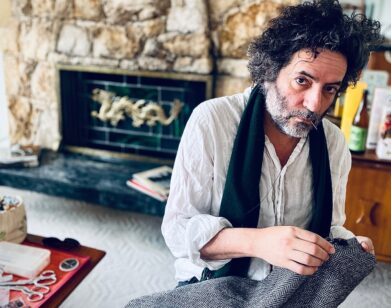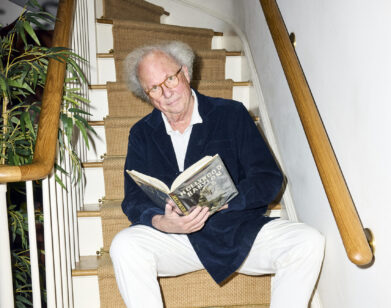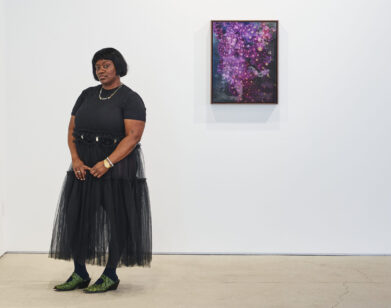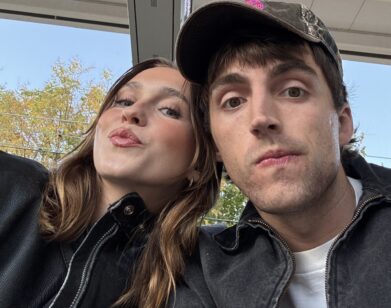Jack Davenport Gives Direction
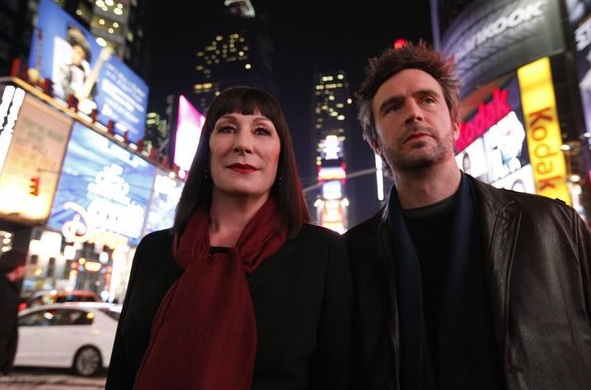
ABOVE: JACK DAVENPORT AND ANJELICA HUSTON IN SMASH
Fans of BBC America or anyone who’s ever lived in England will remember Jack Davenport as Steve from Coupling or Miles from This Life. To everyone else, he’s best known as Commodore Norrington in Pirates of the Caribbean. With a new role on NBC’s Smash, however, Davenport has the potential to become a household name. Davenport plays Derek Wills, the dastardly director of a new Broadway musical about Marilyn Monroe. In many ways, Smash seems like a sure success—it’s produced by Steven Spielberg, and features myriad famous faces (Anjelica Huston, Katherine McPhee, Debra Messing), as well as some exciting new ones (e.g. Raza Jeffrey).
Smash isn’t the first promising television show Jack Davenport has been a part of; it will be his third US series, following Swingtown (2008) and FlashForward (2009). Neither of Davenport’s prior shows made it past the first season, even though FlashForward was also generally well-regarded by critics and had a pretty amazing cast (Joseph Fiennes!). If we’ve learned anything from Pan Am, Playboy Club and Charlie’s Angels, it is that even familiar cast-members, glossy sets and aggressive marketing campaigns cannot ensure a show’s survival; rather, they create high expectations, and a lot of potential for disappointment.
We spoke with Jack Davenport to find out his feelings on the uncertainty of television success, and whether or not he has approached Smash with a little more trepidation than his previous pilots. Our inner Coupling fan was happy that he gave us some long, Steve-like responses.
EMMA BROWN: Where in the world are you right now?
JACK DAVENPORT: I’m in Brooklyn.
BROWN: Are you living in the U.S. these days?
DAVENPORT: I have to, otherwise it’d be a hell of a commute to work.
BROWN: How’s Brooklyn working out for you?
DAVENPORT: Pretty good. Thanks for asking. I lived in Manhattan about 20 years ago, but I have a family now and I’ve done nothing if not conformed to demographics.
BROWN: Can you tell about your part in Smash? Your character seems a little sleazy in the pilot and the commercials…
DAVENPORT: You might think so, on the surface. I slightly disagree. In terms of the pilot, you have to introduce a lot of characters in a very short period of time, and you have to paint with slightly broad brush strokes because you just need to give an audience an idea of who these people might be. It’s true that in the pilot, Derek invites one of the actresses to his apartment with apparently ulterior motives—[but] his MO as a director, and this is true of many directors, [is that] he’s interested in peeling back people’s layers to see what’s really there and to see if what’s there is something he can use. I don’t think that sequence in the pilot is as cut and dry as you might think initially, I think that’s brought out by the way the story develops. [Derek’s] not particularly scrupulous about separating his work and his private life, but he’s also interested in serving the piece of work that he’s working on. Does that make what he’s doing right? Not really. But I think he’s a bit more complicated than just sleazy.
BROWN: How would you describe him, if you had to introduce him to someone?
DAVENPORT: I would say he was temperamental, manipulative, pretty smart, and not quite the monster that you might assume. He has soft and more gentle areas that he works pretty hard to disguise. That gets revealed as time goes on.
BROWN: Have you met directors like Derek?
DAVENPORT: Not exactly. If I had based him on one person alone, my next stop would be small-claims slander court.
BROWN: That’s a lot harder in America than it is in England.
DAVENPORT: Isn’t it just! That’s why lots of Americans go to Britain to sue. Sure, there are aspects of his professional conduct that I recognize. I would be foolish not to occasionally lift from my own experience, but I haven’t just taken one person and said, “Oh, I’ll just pretend I’m that person.” That way danger lies.
BROWN: What do you enjoy most about playing Derek?
DAVEPORT: [pauses]
BROWN: If anything…?
DAVENPORT: Oh, I love him! His character is somewhat reprehensible, and there is always quite a lot of enjoyment when I play less than appealing people to really get stuck into that. Hopefully I have enough self-control that I don’t behave like he does [in my own life]. He’s the sort of character that the writers enjoy writing for, which is a great privilege because we’ve got such great writers on this show.
BROWN: This is your third US TV show?
DAVENPORT: It is.
BROWN: Are you more wary in approaching the show because your last two shows both got cancelled after just one season?
DAVENPORT: I don’t know about wary. What are you asking me am I wary of, exactly?
BROWN: I’ve seen the pilot, and it’s very entertaining, but sometimes new shows can be over-marketed and it sort of destroys them. Are you more cautious in your excitement for the show?
DAVENPORT: I would be a fool to have solid expectations of how a network audience might respond to this show. Do I think the show is good? I think it’s pretty fantastic, to be honest. However, network broadcasting is a whole different animal to cable broadcasting; you are playing to the largest and most spoiled-with-choice demographic probably in the world—China doesn’t count, ’cause they only get state TV and it’s all one channel. People [in the US] can watch anything they like, and it can be very difficult in this fragmented media landscape to get people’s attention. The whole question of the marketing of the show, I think it’s a great compliment, the faith that the powers that be have in the show; they’ve done us a favor, a huge favor, really. In this day and age, certainly on network [television], I don’t think it’s possible to sneak in under the radar. The requirement is that you’re pretty successful pretty much from the get-go. I’m very reassured by the quality of the show we’re producing, but the caprice of the audience is impossible to predict. Would I watch the show? Yes, hell yeah, I would, but that doesn’t mean anything. In terms of being wary, I’m not wary because I’m an actor. I try to choose the projects that I think are the most well written and well executed and the rest of it is so beyond my control to be almost not worth thinking about at all.
BROWN: When people recognize you and approach you in the street, is it mostly because of Pirates of the Caribbean, Coupling or your other work?
DAVENPORT: They have to be very eager-eyed [to recognize me] from Pirates of the Caribbean—I’m pretty well disguised, I either look like a Mardi Gras float or a homeless person, and I don’t tend to go out in public dressed as either of those on a normal day. [When people come up to me] I don’t spend a lot of time saying, “What is it exactly that you recognize me from?” I more concerned with being gracious.
BROWN: You also provided the voice for the Mastercard campaigns…
DAVENPORT: I did. Not the American one, but [I was the voice of Mastercard] Europe for a long time.
BROWN: Have you met Billy Crudup? He provided the US voice.
DAVENPORT: I never met Billy Crudup. I’m told it was him. We’ve never been in a room together before, but I don’t think anyone would notice the extreme coincidence that the two separate English voices of Mastercard are in the same room.
BROWN: That’s not how you’d introduce yourself?
DAVENPORT: Strangely not. Nor would I introduce myself by spinning out the tag line for the campaign either.
BROWN: Can you tell me a little bit about how you got started in acting?
DAVENPORT: I grew up in an acting family. I was heavily discouraged from doing it myself when I was young, which is the only responsible route to take with any child, because it’s not necessarily the easiest of lives. I auditioned for a very small part in a touring production of Hamlet when I was 18 and got the job. I went running around the country not saying much, “I bring you letters my Lord, from Hamlet,” or “Letters my Lord, from Horatio.” There are a lot of letters in Hamlet, and if they don’t get delivered the plot doesn’t move. That’s how I saw it, anyway. [Then] I decided to go to university instead of drama school, because I thought it might be my last chance to study something that wasn’t entirely related to drama.
BROWN: What did you study?
DAVENPORT: Well, English literature and film. It’s not that far away from drama, but it does require an essay or two.
BROWN: Have you ever had a moment where you’ve thought, “I really can’t handle this anymore, I’m quitting!”?
DAVENPORT: No. Cue actor platitude, but I’ve been very fortunate and worked pretty consistently and have felt rather annoyingly grateful that I got to do what I got to do.
THE PILOT EPISODE OF SMASH AIRS TONIGHT AT 10 PM EST ON NBC.


